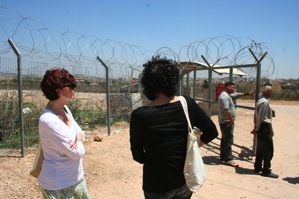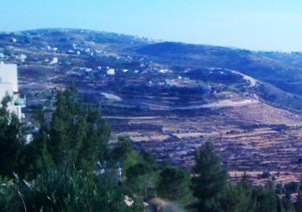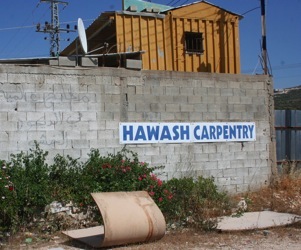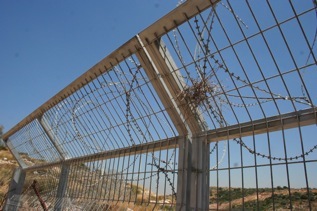
It separates people from their land, their olive trees, their relatives, jobs, homes.
It restricts people’s movements, and it was meant to do that, after the number of Israelis murdered in bombings and other terrorist acts mounted intolerably through half of the last decade. Perpetrators came from the West Bank as well as Gaza, and the barrier has greatly reduced those fatalities.

Jewish ones; far from where we were, at a friend’s home near the Hadassah Hospital in Jerusalem, I would later see a huge gash in the view from their front window—a bulldozed hillside ready to hold a new piece of the wall.)
We stopped at the Habla Gate first, not far from the village of that name and south of the town of Qalqiliya. But between these two is a a large thumb of land about ten kilometers long that the barrier surrounds, to protect the Jewish settlement of Alfe Menashe.

fruit.” A soldier told Susan he would rather be at the beach. Another told us to step back farther, behind the gate. Another trained his binoculars on Habla village.
We stopped at a well-kept nursery and admired the flowers while Susan talked with the vendor. Then we went to lunch in a small village called An-Nabi Elyas, Arabic for the Prophet Elijah. We had delicious shishkebab, falafel, chopped salad, olives, and a colorful array of pickled beets, yellow peppers and other vegetables. Everywhere Susan was greeted as a friend. She asked about families, about how business was going. She and Alix truly do show Palestinians a different Jewish face.
We drove more deeply into the West Bank, passing the villages of Deir Sharaf, Anabta, Jubarra. We drove by signs warning Israelis they are not allowed to pass. In one place, soldiers in a Hummer had pulled a car with Israeli plates to the side of the highway. At Irta, the last checkpoint we visited, at the end of the day, Palestinian agricultural workers were streaming back toward home without being stopped at all—a policy begun there that day. A staff member (this was a privately run checkpoint) did not know why, nor whether it would last. The tired, dusty working men took the change literally in stride.

Earlier, what used to be a checkpoint called Beit Iba was now a road allowing free passage, and we stopped at a small Palestinian factory where fine woodwork and stained glass are made by brothers Susan knows; they export their hand-crafted furniture and doors, even to China now. We shopped at a grocery owned by another friend of Susan’s, next door to his family’s home, a large and pretty house made of Jerusalem stone.
But these were oases in a rather desolate, dusty, poverty-burdened landscape. True, this is the Arab world, and its residents are better off than their cousins in, say, Syria, or Egypt. But they are next door to Israel and under Israel’s thumb, and that makes their lives an Israeli and Jewish responsibility. Dotted around what used to be their land alone are new and growing Jewish communities that are obviously wealthier by far than they, but which have zero contact with them, economic or otherwise.
Ann, visiting Israel and Palestine for the first time, would later say she was stunned by the size of those communities; reading of “settlers” and “settlements” on the West Bank, she had pictured collections of trailers. Then, on the way to Bethlehem, and later, on this remarkable trip, she would see that “settlements” means vibrant, well-established towns, always on the high places, looking down on ancient, proud, but poor Palestinian villages, the people in them practicing the discipline of sumud—steadfast patience and forbearance—but not, surely not without anger.

standing among nations. Except for a right-wing fringe, the whole political spectrum in Israel now accepts the need for a Palestinian state.
Israel’s genius has extended to so many domains, accomplished so many and such varied things. Surely in this domain so vital to its future, it can think of some way to end the stagnation and move forward. V’im lo achshav, aymatai? And if not now, when?
To contribute to MachsomWatch, click here.

Great piece Mel. The quote of Leibovitz was very appropriate.
Steve